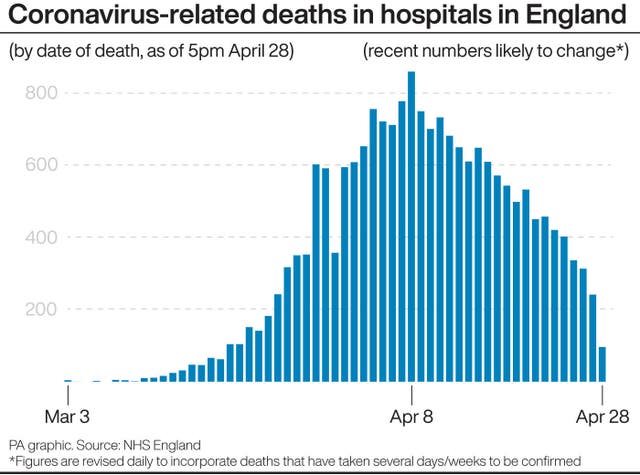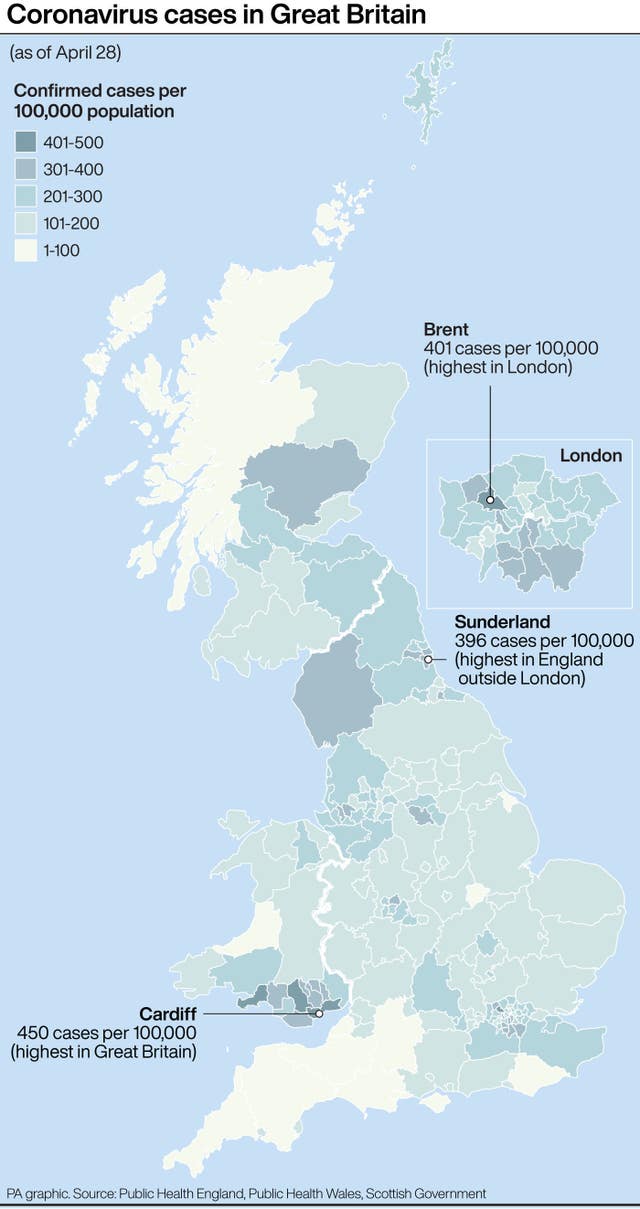
More than 26,000 people with confirmed coronavirus have died in hospitals, care homes and elsewhere in the UK, new figures show.
A total of 26,097 people have died in hospitals, care homes and the wider community in the UK after contracting Covid-19, Public Health England (PHE) said.
It includes 765 deaths reported in the 24 hours to 5pm on Tuesday.
It is the first time data on the number of deaths in care homes and the wider community has been included in the Government’s daily updates.
The total reached by the new method of reporting is around 17% higher than previous data showed and includes an additional 3,811 deaths recorded since the start of the outbreak.
Of these, around 70% were outside hospital settings and around 30% were in hospital.
Foreign Secretary Dominic Raab told the daily Downing Street press conference: “From today, we are moving to an improved daily reporting system for deaths so that deaths in all settings are included wherever the individual has tested positive for Covid-19, rather than just those in hospitals.
“Those figures show that up to yesterday on the new measure we have recorded an additional 3,811 deaths in total, and I think it is just important to say that those additional deaths were spread over the period for March 2 to April 28 so they don’t represent a sudden surge in the number of deaths.”
PHE medical director Dr Yvonne Doyle said the figure for deaths in care homes may be revised up further.
She said: “In due course, those deaths sadly may occur on death certificates, so we may expect more than we are seeing at the moment, yes.”
Separate PHE data shows nearly a third of all care homes in England have reported suspected or confirmed coronavirus outbreaks.
Some 4,516 homes have reported outbreaks since March 17 up until Monday this week – around 29% of the total care homes.
In every region in England more than a fifth of care homes had reported outbreaks.
Mr Raab said 52,429 Covi-19 tests took place on Tuesday – just two days before the date the Government set for reaching 100,000 a day.
It brings the total number to 818,539 across the UK.
Earlier, Mr Raab – standing in for Boris Johnson in Parliament following the birth of the Prime Minister’s son – said there was a “joint horror” across the House at the number of people killed in the outbreak.
They included 85 NHS workers and 23 social care workers – a total of 108.

Meanwhile:
– Michael Gove gave the nod for lockdown easing to take place on some island communities in the UK as a way of piloting how it could happen in the rest of the country.
– Cabinet Office staff working on preparing the UK for exiting the transition period with the European Union have been seconded to assist with the Covid-19 response.
– The Home Office announced that migrant midwives, social workers, pharmacists, and other frontline health staff will be granted free visa extensions for a year.
– A total of 337 prisoners have tested positive for coronavirus in 71 jails as of 5pm on Tuesday, the Ministry of Justice said.
– Professor Calum Semple, from the University of Liverpool, said Covid-19 is just as deadly as Ebola for people admitted to hospital in the UK, after publishing a major British study of almost 17,000 patients.
– Testing tsar Professor John Newton said he was confident the target of performing 100,000 tests would be met on Thursday.
– Education Secretary Gavin Williamson suggested schools could reopen in a “phased manner” when lockdown restrictions are eased, although there was no fixed date for that.
– The economic fallout of the crisis continued, with retail giant Next warning the impact of the lockdown had been “faster and steeper” than expected.
– The UK’s biggest tour operator, Tui extended the suspension of its holidays up to and including June 11.

The impact of the virus on businesses and consequently the public finances has added to the pressure on ministers to set out how lockdown measures might be eased.
Downing Street was forced to deny it had watered down one of the five tests required for allowing the measures to be lifted.
Rather than stating in test five that the Government had to be confident any adjustments would not “risk a second peak of infections”, the wording was changed to say no weakening of restrictions would be made that risked a second peak that “overwhelms the NHS” – a lower bar.
The lockdown is due to be reviewed on May 7.
The scientific advisory group for emergencies (Sage) is working on a range of options for easing restrictions while still keeping the reproduction rate of the virus – the number of new cases linked to a single individual – below one in order to stop it spreading exponentially.
Mr Raab said it is vital the UK proceeds “carefully” in lifting lockdown measures as he pointed to the rising transmission rate in Germany.
He said: “This is a very real risk and it is vital we proceed carefully, guided by the scientific advice, so that our next step through this crisis is a sure footed one.
“We mustn’t gamble away the sacrifices and the progress that we have made – we must continue to follow the scientific evidence and we must continue to take the right decisions at the right moment in time.”
Prof Doyle added that it was “slightly worrying” that Monday saw the highest working day use of motor vehicles since March 23 – the start of the lockdown.


Comments: Our rules
We want our comments to be a lively and valuable part of our community - a place where readers can debate and engage with the most important local issues. The ability to comment on our stories is a privilege, not a right, however, and that privilege may be withdrawn if it is abused or misused.
Please report any comments that break our rules.
Read the rules here